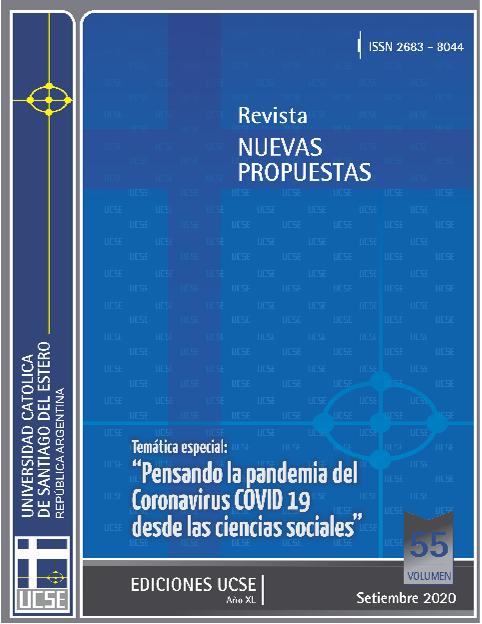Mostrar el registro sencillo del ítem
dc.contributor.author
Tapia, María Gabriela
dc.contributor.author
Melendez, Cecilia Evangelina

dc.date.available
2021-01-13T20:54:06Z
dc.date.issued
2020-09
dc.identifier.citation
Tapia, María Gabriela; Melendez, Cecilia Evangelina; Escuela secundaria en tiempos de pandemia: La fragmentación del sistema educativo al descubierto; Universidad Católica de Santiago del Estero; Nuevas Propuestas; 55; 50; 9-2020; 60-69
dc.identifier.uri
http://hdl.handle.net/11336/122665
dc.description.abstract
Ante la Pandemia COVID 19 los establecimientos educativos fueron identificados como focos potenciales de transmisión masiva del virus por lo que cerraron sus puertas, la educación se trasladó a los hogares. La escuela no dejó de funcionar, pero como parte de un sistema educativo fragmentado, su despliegue será diferente en cada sector social. La fragmentación educativa refleja una diversificación en las estructuras sociales, marcando distancias entre grupos sociales. En el presente trabajo pretendemos analizar y reflexionar cómo las escuelas secundarias de la Ciudad Capital de la provincia de Catamarca han continuando sus actividades en los distintos sectores sociales y, lo que cada establecimiento es pera de los alumnos egresados. El material empírico de nuestro estudio proviene de entrevistas semiestructuradas a directivos de escuelas secundarias de la Ciudad Capital de Catamarca y datos de campo recopilados en el cuerpo docente. La pandemia ha profundizado las desigualdades, los sectores más privilegiados se ajustaron rápidamente a la realidad y lograron contener al alumnado, mientras que los más desventajados, en algunos casos perdieron el contacto de docentes con sus estudiantes; para ellos la escuela tradicional, presencial, sigue siendo insustituible más allá de los esfuerzos por continuar con su rol tutelar desde la virtualidad.
dc.description.abstract
With the outbreak of the COVID-19 pandemic, schools were identified as potential focal points of the virus massive transmission. That is why they closed their doors and education moved to the students’ homes. Schools did not stop working, but as they form part of a fragmented educational system, the activities they managed to do would be different in each social sector. Educational fragmentation shows a diversification in social structures, setting social groups apart from each other. In this work, we want to analyze and reflect on how the high schools of the capital city of the province of Catamarca have continued their activities in the various social sectors, as well as what each institution expects from their graduates. The empirical material in our study comes from semi-structured interviews we had with principals of the high schools from Catamarca and from field data collected from the teaching staff. The pandemic has deepened inequalities: while the most privileged sectors could quickly adapt to the new reality and managed to support the students, in some cases, the more disadvantaged ones lost contact with their teachers. For the latter, traditional, in-person class is still irreplaceable, no matter the efforts schools make to continue providing for their guardian role from virtual environments.
dc.format
application/pdf
dc.language.iso
spa
dc.publisher
Universidad Católica de Santiago del Estero
dc.rights
info:eu-repo/semantics/openAccess
dc.rights.uri
https://creativecommons.org/licenses/by-nc-sa/2.5/ar/
dc.subject
Escuela secundaria,
dc.subject
fragmentación
dc.subject
pandemia
dc.subject
enseñanza virtual
dc.subject
COVID-19
dc.subject.classification
Otras Ciencias de la Educación

dc.subject.classification
Ciencias de la Educación

dc.subject.classification
CIENCIAS SOCIALES

dc.title
Escuela secundaria en tiempos de pandemia: La fragmentación del sistema educativo al descubierto
dc.title
Secondary school in times of pandemic: The fragmentation of the education system exposed
dc.type
info:eu-repo/semantics/article
dc.type
info:ar-repo/semantics/artículo
dc.type
info:eu-repo/semantics/publishedVersion
dc.date.updated
2020-12-03T13:47:50Z
dc.identifier.eissn
2683-8044
dc.journal.volume
55
dc.journal.number
50
dc.journal.pagination
60-69
dc.journal.pais
Argentina

dc.description.fil
Fil: Tapia, María Gabriela. Consejo Nacional de Investigaciones Científicas y Técnicas. Centro de Investigaciones y Transferencia de Catamarca. Universidad Nacional de Catamarca. Centro de Investigaciones y Transferencia de Catamarca; Argentina
dc.description.fil
Fil: Melendez, Cecilia Evangelina. Consejo Nacional de Investigaciones Científicas y Técnicas. Centro de Investigaciones y Transferencia de Catamarca. Universidad Nacional de Catamarca. Centro de Investigaciones y Transferencia de Catamarca; Argentina
dc.journal.title
Nuevas Propuestas
dc.relation.alternativeid
info:eu-repo/semantics/altIdentifier/url/http://www.ucse.edu.ar/nuevaspropuestas/
Archivos asociados
